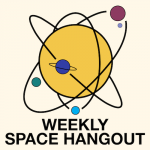Podcaster: Host : Dr. Pamela Gay ; Guest: Ian Jakupca, Dr. Morgan Rehnberg, Dr. Kimberly Cartier

Title: Weekly Space Hangout: Why Hello Sag A* – It’s Nice to Finally See You, with Dr. Lia Medeiros
Link: Cosmoquest: http://cosmoquest.org
Description:
Today’s story:
- Boeing StarLiner test flight.
- Uranus & Neptune… What’s the difference? I’m hazy…
- ESA’s JUICE (JUpiter ICy moons Explorer) mission…
- JWST update! July 12 first science!
Host: Dr. Pamela Gay ( https://cosmoquest.org/x/ & @starstryder )
Special Guest: Developing reliable, renewable, and safe power/energy storage systems is a key requirement for future space missions, both within our solar system and those venturing beyond it, as well as for establishing a permanent human presence on the moon and/or Mars. Are fuel cells one solution to this need? And what exactly constitutes a fuel cell? Find out tonight as we are joined by Ian Jakupca from NASA’s Glenn Research Center.
After graduating from the University of Dayton, Ian began developing specialized flow control components, instrumentation and electrochemical stacks for aerospace systems at the National Aeronautic and Space Administration (NASA) Glenn Research Center in Cleveland, Ohio in 2000. His initial work supported the development team working on the next generation Space Shuttle Orbiter fuel cell power system before transitioning to oxygen and hydrogen generation through water electrolysis and regenerative fuel cell energy storage systems. This early component work supported efforts to monitor and operate regenerative fuel cell energy storage systems in vacuum environments. Over time his work expanded to system-level designs to meet the requirements of a range of vehicles.
Ian’s primary research interest is the efficiency of integrated electrochemical systems with a focus on low-power techniques to manage reactants, heat, power and instrumentation. He led multiple system design and demonstrations efforts for air-independent (H2/O2) primary and regenerative fuel cell systems. To date, he has innovation awards for software and hardware and is the lead author on over 20 external publications.
As the Fuel Cell Technology Lead at NASA Glenn Research Center, Ian supervises and consults for multiple technology development projects involving ISRU electrolysis, primary fuel cells, and regenerative fuel cells for space and aerospace applications.
To learn more about the research being done in fuel cell technology (and more!) view the following presentations: https://www.energy.gov/sites/prod/files/2017/05/f34/fcto_bop_workshop_jacupka.pdf ; https://www.hydrogen.energy.gov/pdfs/review19/ia011_jakupca_2019_o.pdf
Regular Guests:
- Dr. Morgan Rehnberg ( http://www.morganrehnberg.com/ & @MorganRehnberg )
- Dr. Kimberly Cartier ( http://KimberlyCartier.org & @AstroKimCartier )
Today’s sponsor: Big thanks to our Patreon supporters this month: Rob Leeson, David Bowes, Brett Duane, Benett Bolek, Mary Ann, Frank Frankovic, Michael Freedman, Kim Hay, Steven Emert, Frank Tippin, Rani Bush, Jako Danar, Joseph J. Biernat, Nik Whitehead, Michael W, Cherry Wood, Steve Nerlich, Steven Kluth, James K Wood, Katrina Ince, Phyllis Foster, Don Swartwout, Barbara Geier, Steven Jansen, Donald Immerwahr
Please consider sponsoring a day or two. Just click on the “Donate” button on the lower left side of this webpage, or contact us at signup@365daysofastronomy.org.
Or please visit our Patreon page: https://www.patreon.com/365DaysOfAstronomy
End of podcast:
365 Days of Astronomy
=====================
The 365 Days of Astronomy Podcast is produced by Planetary Science Institute. Audio post-production by Richard Drumm. Bandwidth donated by libsyn.com and wizzard media. You may reproduce and distribute this audio for non-commercial purposes.
This show is made possible thanks to the generous donations of people like you! Please consider supporting to our show on Patreon.com/365DaysofAstronomy and get access to bonus content.
After 10 years, the 365 Days of Astronomy podcast is poised to enter its second decade of sharing important milestone in space exploration and astronomy discoveries. Join us and share your story. Until tomorrow! Goodbye!

